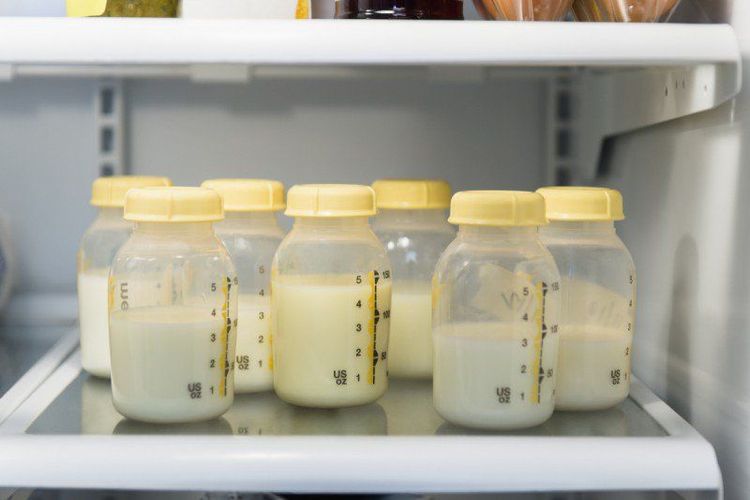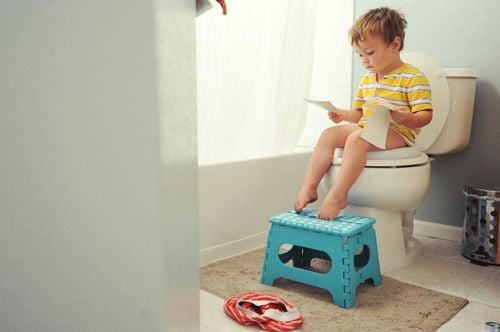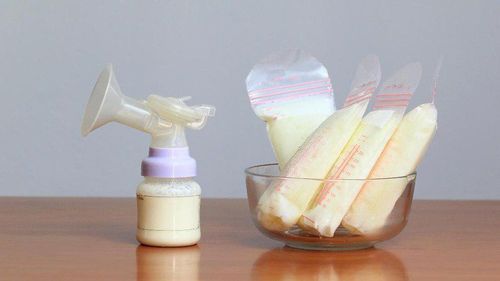Article professionally reviewed by Dr. Doan Ngoc Quynh Tram - Department of Pediatrics - Neonatal - Vinmec Nha Trang International General Hospital.
Breast milk after being refrigerated and thawed may have various odors, such as soap-like, rancid, or fishy smells. To remove odors from frozen breast milk, mothers should follow all safe breast milk storage guidelines and try some of the suggested methods below for removing fishy odors from frozen breast milk.
1. Methods to Remove Odors from Frozen Breast Milk
Breast milk after being expressed, frozen, and thawed may have some unusual odors, caused by the process of preventing harmful bacterial growth by an enzyme called lipase. Fat breakdown reactions and fatty acid release sometimes alter the aroma of breast milk, however, babies can safely consume it without harm if mothers have properly frozen the breast milk
If the baby still accepts breastfeeding, mothers can confidently continue feeding as normal. Conversely, if the baby refuses, mothers can remove odors from frozen breast milk as follows:
1.1. Mixing milk
- Mix completely thawed milk with fresh unfrozen milk in a 1:1 ratio to reduce the odor, then try feeding the baby;
- If the child still doesn't cooperate, increase the proportion of freshly expressed milk in the mixture;
- After some time when the baby has adapted, gradually reduce the amount of fresh milk when mixing.
Note, if the baby refuses to feed or doesn't finish feeding, mothers must not mix fresh milk with thawed milk and then refreeze the breast milk.
1.2. Removing odors before freezing
In cases where those methods for removing fishy odors from frozen breast milk aren't effective, mothers can remove odors before freezing breast milk:
- Express milk and heat it on very low heat;
- When bubbles start forming around the edges, turn off the heat;
- Let it cool then freeze breast milk as normal.
This method of removing odors from frozen breast milk is very effective at reducing smell, however, the disadvantage is that it causes some loss of antibodies. Therefore, it's crucial to absolutely not boil the milk to minimize nutrient loss.
2. Notes on Freezing Breast Milk
Experts confirm that freshly expressed breast milk has antibacterial properties, containing more antioxidants, vitamins, and fats than refrigerated or frozen milk. However, for various reasons, mothers can still express breast milk cleanly and safely, then store and preserve milk at room temperature, in the refrigerator, or in the freezer depending on time. Specific safe storage times are:
- Room temperature (16 - 25°C): 4 - 6 hours;
- Refrigerator (≤ 4°C): 3 - 5 days;
- Freezer (≤ -18°C): 6 - 9 months;
- Thawed breast milk: Can be kept for maximum 2 hours at room temperature and 24 hours in the refrigerator, however cannot be refrozen.

In this process, good hygiene plays a very important role in ensuring breast milk is safest and most nutritious for the baby. Additionally, remember the following notes to limit milk odors and avoid spending time removing odors from frozen breast milk:
- Always label with quantity and expression date to track and manage stored milk;
- Gently swirl the bottle to mix separated cream layers before feeding, don't stir or shake vigorously as this damages milk's nutritional components;
- Should discard milk within 1 - 2 hours after feeding as bacteria from the mouth can enter the milk;
- To avoid wasting expressed milk and make thawing easier, store milk in small quantities (under 60 ml) and only thaw what's needed;
- Freeze breast milk as soon as possible after expression;
- Should store breast milk in specialized bags or bottles, made from BPA-free materials, some products (like glass bottles) can crack at very low temperatures;
- Don't thaw or warm milk in the microwave or in boiling water as this can destroy nutrients and burn the baby. Instead, place the bottle or milk bag in warm water for a few minutes until milk reaches body temperature (37°C to under 40°C).
Generally, feeding babies breast milk that has been gently heated to remove odors before freezing still provides sufficient nutrients for development, which is also better than using formula milk that contains no antibodies. However, doctors still recommend parents try to get babies to accept thawed milk. If freezing breast milk isn't necessary, mothers can express milk and store it in the refrigerator for gradual use.
For more knowledge about nutrition and childcare by age, parents should regularly visit vinmec.com and make appointments with leading pediatricians and nutrition experts at Vinmec International General Hospital when needing advice about children's health.
Reference source: medela.com
LAMINKID I Health Supplement:
The product has the function of supplementing minerals and vitamins for the body. Supports digestion, enhances food absorption, helps children eat well. Supports strengthening children's immunity, helps reduce the risk of diseases due to poor immunity such as upper respiratory tract infections, flu.
Target users:
- Children with poor appetite, poor food absorption, weak and malnourished children, developmental delays.
- Children with weak immunity, currently sick or recovering from illness, children prone to upper respiratory tract infections, flu.
Responsible for product quality:
Elepharma Pharmaceutical Joint Stock Company
No. 9, Truong Cong Giai Street, Group 17, Dich Vong Ward, Cau Giay District, Hanoi City, Vietnam
(Tel) 1800 6091; (E) info.elepharma@gmail.com
View more product information at: https://i.vinmec.com/laminkid
Register for child nutrition consultation at: https://i.vinmec.com/dangkytuvandinhduong
Reference source: medela.com
To arrange an appointment, please call HOTLINE or make your reservation directly HERE. You may also download the MyVinmec app to schedule appointments faster and manage your reservations more conveniently.









